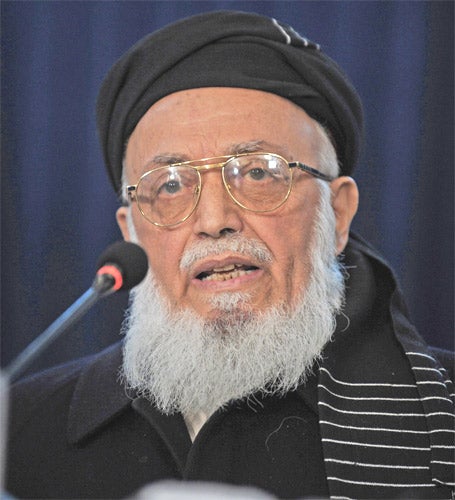Afghan peace effort in tatters as turban bomb kills ex-president
Delegates' reaction to Rabbani's role as High Peace Council head was so ferocious that he was forced to flee

Your support helps us to tell the story
From reproductive rights to climate change to Big Tech, The Independent is on the ground when the story is developing. Whether it's investigating the financials of Elon Musk's pro-Trump PAC or producing our latest documentary, 'The A Word', which shines a light on the American women fighting for reproductive rights, we know how important it is to parse out the facts from the messaging.
At such a critical moment in US history, we need reporters on the ground. Your donation allows us to keep sending journalists to speak to both sides of the story.
The Independent is trusted by Americans across the entire political spectrum. And unlike many other quality news outlets, we choose not to lock Americans out of our reporting and analysis with paywalls. We believe quality journalism should be available to everyone, paid for by those who can afford it.
Your support makes all the difference.A militant detonated a bomb hidden in his turban as he met the former Afghan president Burhanuddin Rabbani yesterday, killing the man given the task of reconciling with the Taliban and further crippling efforts to bring peace to the county.
Two insurgents feigning an interest in coming in from the cold met Mr Rabbani at his house in Kabul's diplomatic enclave, close to the site of last week's 20-hour battle between security forces and Taliban-linked militants.
According to initial reports, one of them detonated the explosives hidden in his turban, as he hugged Mr Rabbani, killing the politician instantly.
Massoum Stanikzai, President Hamid Karzai's advisor on reconciliation and reintegration – a technocrat seen as the architect of the Afghan government's overtures for peace – was left "alive but badly wounded" by the blast, according to police.
President Karzai promptly cut short his visit to the UN General Assembly in New York to return home and deal with the fallout – which could, over time, be considerable.
Mr Rabbani was one of the most divisive figures in Afghan politics. The softly-spoken, frail old man was once one of the country's most notorious warlords, leader of the Jamiat-e-Islami party and the man who helped plunge Afghanistan into the bloodiest phase of its civil war when he refused to relinquish its rotating presidency in 1994. He continued to rule until the Taliban took power in 1996.
When, in 2010, he was unilaterally appointed as chairman of the fledgling High Peace Council, the reaction from delegates convened by Mr Karzai to rubber stamp the fait accompli was so ferocious that Mr Rabbani was forced to flee, and returned only after his allies had bullied delegates into a surly silence. The Taliban took Mr Rabbani's appointment as a powerful insult, said Michael Semple, an academic and one of the leading proponent's of a negotiated peace in Afghanistan.
"They're just so angry that it's difficult to communicate," he told The Independent recently. "It's such a wicked move that appointment. Karzai's not stupid... he knows how hated Rabbani is. So the Taliban hold up the example of the High Peace Council as concrete evidence that neither Karzai nor the Americans whom they see as backing him are serious about reconciliation."
Yet for all those who despised Mr Rabbani, there were many who loved him. To many members of Afghanistan's ethnic Tajik community, he was a hero, a defender of their interests. Ahmed Wali Massoud, brother to the late anti-Taliban fighter Ahmed Shah Massoud, told The Independent: "He has been a great leader, leading the mujahedin resistance, as well as the jihad for 30 years. He has been huge. Therefore his assassination, especially the way it happened, is of concern for everyone."
Rabbani is the latest high-profile Afghan politician to fall victim to the Taliban's assassination campaign. In July, a turban bomber killed Ghulam Haider Hamidi, the mayor of Kandahar City. Barely a week before that, a trusted bodyguard of Ahmed Wali Karzai, the President's half-brother, shot his employer in the head. Assassins also killed the top police commander in northern Afghanistan, General Daud Daud, in a bombing in late May.
Haroun Mir, a political analyst in Kabul, said that the latest assassination was further blow for peace. "People have become disillusioned about this process and the assassination of President Rabbani will make this sentiment much stronger," he said. "But it's also a big setback for Karzai, because President Rabbani was a big supporter of Karzai, and his engagement in this process made it a a national process... His vacuum will not be filled."
Join our commenting forum
Join thought-provoking conversations, follow other Independent readers and see their replies
Comments